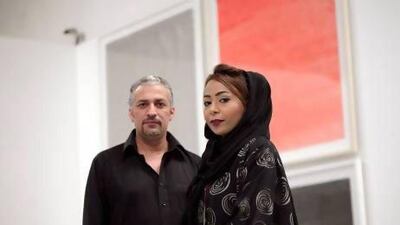The UAE seems so preoccupied with its present and future, we sometimes forget it has a past. Nowhere is this truer than in the realm of culture. Thinking about the UAE of the 1970s conjures up images of barren lands punctuated by lone skyscrapers. Yet artistically, this period was bristling with an experimental fervour that seems relegated to a past as dusty as that forlorn landscape.
Some names - Hassan Sharif, the Group of Five - ring a distant bell. But their pioneering creativity in the nascent UAE has surprisingly little currency today, like a background hum amid the clamour of thriving galleries and looming museums.
Two voices pierce this din: the Dubai-based Mohammed Kazem, a former student of Hassan Sharif and a pillar of the Group of Five, recently nominated to represent the UAE at the 55th Venice Biennale; and Kazem's one-time student, Ebtisam Abdulaziz, a distinguished Sharjah-based artist with a string of biennials to her credit, and who is participating in the Delfina Foundation's Artist-in-Residence, which has just started in Dubai.
Observing these two generations of Emirati artists in an interview at Kazem's studio, one is struck by the confident continuity of shared beliefs - in the importance of education, the value of their artistic heritage - punctuated by some critical differences of opinion. As the double interview unfolds, we get a privileged view of the state of UAE art, its phantoms and its promise.
The Group of Five was the UAE's first art scene. Three generations passed through the group's hands, from the founder Hassan Sharif in the late 1970s through to Mohammed Kazem in the 1980s, down to Ebtisam Abdulaziz and her contemporaries in the early 2000s. United by a contemporary vision at a time when arts in the UAE were anything but, the early group members took teaching as seriously as they did art.
Under Kazem's eyes, the group's Open Studio was a welcome gift for fledgling artists at the time. "I did not receive any kind of art education in school," recalls Abdulaziz. "I felt I had talent, but no one helped me work on it and develop it.
"The group influenced me a lot. I had reached a point where painting wasn't enough, so I sought your help [addressing Mohammed Kazem]. I remember you gave me one of Hassan's books about Systemic Art, and this helped me overcome that obstacle."
Such opportunity is rare today, as the educational flame sparked by the group has dwindled. Abdulaziz believes artists themselves should resume this cause, whereas Kazem points to institutions. "Education policy should change," he insists, "for the simple reason that we now have numerous art institutions and the already famous Sharjah Biennale. We need to make a gradual inclusion of art into education."
Almost every discussion is riddled with the word "gap". Abdulaziz boasts having a "scan" on the new generation of Emirati artists, through seminars she organised at the Maraya Art Centre in Sharjah. Yet she seems perplexed by their ahistorical stance.
"I remember I was a judge in a photography competition in 2007. I was surprised that most photographers were unaware of the medium's founding artists. They use the tools, the materials, without knowing why."
The evident complicity between these two generations seems on the verge of extinction. "Today, most arts graduates are more European," remarks Abdulaziz, "and less affiliated with their own society, in terms of the way they think and their connection with the older generation of artists. Most of them don't even know Hassan Sharif!"
Far from hollow nostalgia, both Kazem and Abdulaziz believe understanding previous generations' work dictates how an artist will influence subsequent generations. "Hassan's generation gave me something I still use today," explains Abdulaziz, "and I learnt the artist's role is not just to produce a work, but to give something back to society."
Perhaps stemming from this early influence, their own works present obvious overlaps, such as the use of data and numbers, and a pronounced autobiographical slant. Both evoke thorny social concerns (Abdulaziz's sly swipes at consumerist society; Kazem's continuing examination of control and boundaries), yet they remain divided on art's fundamental role. "The function of art is to present problems," maintains Abdulaziz, "and find solutions through the work itself." Philosophically, the 43-year-old Kazem retorts: "An artist cannot solve social and political issues."
Each artist is now poised for global recognition - there is Kazem's solo show at Venice, while Abdulaziz is involved with Delfina Foundation's Artist-in-Residence programme, among other international pursuits. She is currently working on a project which will be shown at Art Dubai in March. In this context, Abdulaziz asks a final question: "Has UAE contemporary art arrived at a level that we, as artists, hope for?"
Kazem's cautious reply embraces past, present and future: "Let's measure that based on the age of our country. In 41 years, we have accomplished many things. Emirati art is becoming more evident. Our experience is making itself felt."

